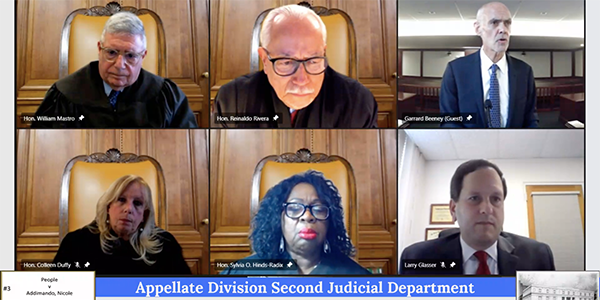The application of the DVSJA in Nicole’s case sets a high bar for the compassionate treatment of survivors in the criminal justice system.
On July 14, 2021, Sanctuary for Families and the Incarcerated Gender Violence Survivors Initiative were part of a legal team that achieved a remarkable, ground-breaking result for domestic violence survivors in New York State. On that day, a New York appellate court dramatically reduced the sentence of defendant Nicole Addimando—by more than a decade—because she had demonstrated that her crime was directly related to the severe abuse she had suffered for years at the hands of her domestic partner. For the first time, an appellate court applied New York’s revolutionary Domestic Violence Survivors Justice Act (DVSJA) to ensure that a survivor’s experiences were credited and that she received a compassionate sentence in line with a modern understanding of the effects of prolonged abuse.
The Incarcerated Gender Violence Survivors Initiative
What does it take to change systems that have historically been stacked against survivors of abuse, particularly women of color? The answer to this question was the foundation of our Incarcerated Gender Violence Survivors Initiative. Formed in 2017 by Sanctuary attorneys and pro bono partners, the Initiative seeks to secure the release of gender violence survivors who have been imprisoned in New York State for crimes committed after prolonged domestic abuse, through a comprehensive approach: legislation, legal representation, training, and education.
In 2019, the Initiative, along with survivors and advocates across New York, achieved a major success when New York enacted the Domestic Violence Survivors Justice Act (“DVSJA”) after nearly a decade of hard-fought advocacy.
The DVSJA affords judges the discretion to impose reduced sentences if a defendant was “a victim of domestic violence subjected to substantial physical, sexual or psychological abuse inflicted by a member of the same family or household,” the abuse was “a significant contributing factor” to the crime, and, taking all of the circumstances into account, a standard sentence would be “unduly harsh.” The DVSJA allows defendants to seek a reduced sentence after conviction, and it also allows defendants who were sentenced before the DVSJA’s enactment the opportunity to apply for re-sentencing.
In New York, the passage of the DVSJA was hailed as a major victory by advocates of criminal justice reform and the movement to end gender violence. To be effective, however, laws must be applied as intended. Since 2019, Initiative members have worked to educate practitioners and courts on the DVSJA, but until the Nicole Addimando case there was no clear legal precedent on how it should be properly applied.
Nicole Addimando
Nicole Addimando is the proud mother of two young children who was living in Poughkeepsie, NY. At the age of 19, she began dating the father of her children. Throughout their nine-year relationship, Nicole’s partner became increasingly abusive, including sadistic sexual and physical violence, threats, and psychological and emotional manipulation. One night in 2017, he brandished a gun and threatened to kill both Nicole and himself, leaving their children to grow up parent-less. That night, Nicole used the gun to kill him.
In April 2020, following a jury trial, Nicole was convicted of second-degree murder and second-degree criminal possession of a weapon. Despite detailed testimony and evidence outlining one of the most extreme histories of abuse we at Sanctuary and many others in the field have seen, the trial judge ruled that the DVSJA should not apply in her case, and she should not receive a reduced sentence. Using a badly outdated understanding of the effects of prolonged domestic abuse, the judge concluded, among other things, that the history of abuse was somehow unclear, and that Nicole could have easily and safely escaped from her abusive home and relationship. Nicole was shockingly given a prison term of 19 years to life.
For advocates in New York State and across the country, the sentencing decision was disheartening. Nicole Addimando was precisely the kind of survivor for whom the DVSJA was written and enacted.
The Appeal
Sanctuary Board Member and Sullivan & Cromwell partner Garrard Beeney and a team of Sullivan & Cromwell lawyers took on the massive undertaking of filing an appeal on Nicole’s behalf. He and his team moved quickly, forming a powerful coalition including, among others, Sanctuary, The Legal Aid Society, and Nicole’s trial attorneys, to challenge both the conviction and the judge’s failure to apply the DVSJA at sentencing.
The appeal demonstrated that the trial judge’s refusal to apply the DVSJA reflected deeply flawed understandings of the dynamics of abuse, the impact on survivors’ memories, the risk assessment survivors make when determining life or death situations, and the application of the DVSJA — views that unfortunately pervade our justice system.
One of the roles Sanctuary took on was to coordinate the filing of two amicus briefs (supplemental legal briefs submitted by third parties to provide judges with additional background or information on the potential impacts of a decision). First, a team of deeply trauma-informed attorneys at the firm of Davis Polk drafted an amicus brief about the impact of trauma on survivors’ memories and the way trauma informs survivors’ decisions, to be filed on behalf of a group of domestic violence service providers. Second, a devoted team of attorneys at the firm of Duane Morris drafted a highly insightful amicus brief detailing the legislative history of the DVSJA and its intended application, to be filed on behalf of the very New York State legislators who drafted and passed the statute.
On April 22, 2021, Garrard Beeney argued the case before a panel of four judges from the Appellate Division – Second Department. Oral argument lasted approximately two hours and can be viewed here.
On July 14, 2021, the appellate court issued its decision. Much to the disappointment of Nicole, her legal team, family, and friends, the judges upheld Nicole’s conviction. In a blistering rebuke of the trial court’s sentencing, however, the appellate court held that the trial judge relied on thoroughly outmoded views of the impact of domestic violence and misinterpreted the legislative intent of the DVSJA and the circumstances of the case. Though not overturned as we hoped, Nicole Addimando’s sentence was reduced from 19 years to life to a term of 7 ½ years. We expect Nicole to be released to her family in less than three years. The full decision can be viewed here.
The Silver Lining: A Precedent for New York
As the first DVSJA decision to be issued by a New York appellate court, the Nicole Addimando decision is precedent-setting and should pave the way for more compassionate treatment for survivors throughout the state.
First, after reviewing the record, the court held that “through her lengthy testimony, photographs, and other evidence,” Nicole had shown that her domestic partner had “repeatedly abused her physically and sexually.” Second, the court held that the evidence, “which included a detailed history of repeated sexual, physical, and psychological abuse … expert testimony regarding the impact of that abuse on the defendant, and the defendant’s testimony regarding the events prior to the subject shooting, established that the abuse was a significant contributing factor to the defendant’s criminal behavior.” Third, the court held that in determining a sentence, the trial court “failed to fully take into account the impact of physical, sexual, and/or psychological abuse on the defendant as a domestic violence survivor.” The court concluded that “[t]his approach simply runs afoul of the spirit and intent of the statute. It is unacceptable that, in reflecting the views of a more enlightened society, the Legislature saw fit to enact the DV Survivor’s Act, only to have the court frustrate that legislative intent by applying outdated notions regarding domestic violence issues.”
The court’s decision adopted the arguments made by the Sullivan & Cromwell team in its briefs and Garrard’s oral argument, as well as the arguments in the amicus briefs submitted by Davis Polk and Duane Morris. In sum, the decision in Nicole Addimando’s case, beyond reducing her sentence dramatically, should have a profound impact on how prosecutors and courts apply the DVSJA, and how the criminal justice system views and treats survivors moving forward. While disappointed that her conviction was not reversed, Ms. Addimando has repeatedly mentioned the strength she has gained from obtaining a decision that will help survivors across the state and the country, and the vindication she has obtained from a finding that she was in fact abused and that that the abuse led to the crimes for which she was convicted.
New York Leads the Way
As the country reckons with the ways racism, misogyny, and poverty have fueled mass incarceration and the incarceration of abuse survivors, New York is setting an example that other states will hopefully choose to follow. The passage of the DVSJA and the correct application in Nicole’s case set a high bar for the compassionate treatment of survivors in the criminal justice system.
But our work is far from over. The appellate court’s decision to allow Nicole’s conviction to stand reflects the need for continued education and advocacy on behalf of gender-violence survivors. Nicole and similarly-situated survivors should never be convicted, incarcerated, and separated from their families for the sole crime of defending their own lives. The Initiative, its pro bono partners, and dedicated advocates across New York State intend to continue fighting for justice in every survivor’s case.
—
Nicole Fidler is the director of Sanctuary’s Pro Bono Program. Ross Kramer is the director of the Incarcerated Gender Violence Survivor Initiative.

